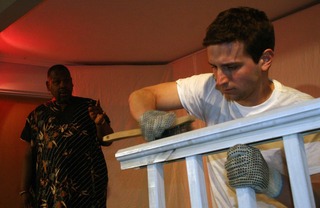
Although controversial, John Shea’s The Painter has passed inspection by the Somerville Human Rights Commission and others. - Photo by Andrew Firestone
By Andrew Firestone
While the controversy surrounding Somerville resident John Shea’s new play The Painter appeared to reach fever pitch, those who sat and watched the performance came away with a very different attitude. Members of the Somerville Human Rights Commission attended a recent performance of the one-act, starring Jered Wright and Michael Nurse, and came away without complaint.
“I thought it was very interesting in terms of talking about subject matter that, frankly, we don’t really talk in terms of race relations,” said Raffi Freedman-Gurspan, LGBT liaison for the City, who is of Dominican descent. “I don’t think it was problematic; I think it was very “in-your-face” in a way, and that sometimes makes people uncomfortable, but for me it wasn’t as much.”
The play, surrounding the murder of a black professor by an immigrant worker, generated protests over its subject matter, partly due to a scene in which the unnamed painter (Wright) fantasizes about whipping the homeowner as a slave, portrayed by Nurse.
“Originally when I read it, I didn’t like it either. I was a little against it. I wanted it toned down and trimmed down,” said Nurse. “And then I got used to it because it shows the absurdity that comes with doing theater and it’s the coin flip of what [the painter] experiences on the other side.”
He said he enjoyed the role for it’s complexity and range, and also was greatly impressed with Shea’s writing, which he said, “threw him a curveball.”
“For you it’s a right, for black people it’s a privilege that very few ever get to exercise,” Nurse recalled the line, saying that Shea could only have come to understand this through deep discussion with members of the African-American community.
Much of the Shea’s writing plays off a bit like Tarentino, without the smash cuts, gunshots, or explosions used as spectacle, but carrying a sharp edge to it’s thematic dialogue. Both characters move through the play exploring their relationship on many social levels, both before and after the murder. While the homeowner appears to pontificate a bit in his “ghost form” there appears to be no racist overtone, nor hateful feeling which emanates from the stage. There is only a feeling of regret, and sadness regarding the terrible anger which exists in both downtrodden, flawed individuals.
Robert Lublin, director of UMASS Boston program for performing arts, and director of the play, said he appreciated the depth associated with Shea’s writing, and saw Nurse’s character as “someone who has had to fight the fights that define the current moment,” for his whole life, and grown embittered by it.
“All the opportunity that is embodied in the fact we currently have a black president is a consequence of some very fierce fighting that has occurred over the years,” that led to a better racial environment, said Lublin. “The people who had to fight to achieve the present are very, very angry about the fights that they shouldn’t ever have had to fight,” he said.
“As a person of color myself, but having white parents, it’s something that honestly I realize I don’t even talk about with my parents, about our race relations,” said Freedman-Gurspan. “The fact [is] that sometimes they’re subjects that make everyone uncomfortable but sometimes have to be talked about.”















Reader Comments